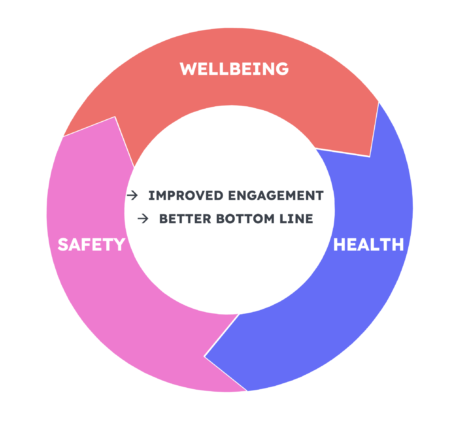Wellbeing: Resilience
- 20 May 2024
- Uncategorized
- Comments : 0
What Everybody Should Know About Wellbeing: Resilience
Welcome to the final of our 6-part special “What Everybody Should Know About Wellbeing”. Today is all about personal resilience.
Over the past few years, people have been talking more and more about resilience – but many people don’t really understand what resilience is, how resilient they currently are, or what they can do to become more resilient.
We see resilience as being a key area of wellbeing, and in this article, we’ll answer the above questions.
What is resilience?
Resilience is the capacity to bounce back from setbacks and hardships, to keep going in the face of tough demands, and to feel stronger and more able to cope than before.
Resilient people demonstrate great flexibility, high energy, and mental agility and consistently perform at their highest level. They have strong relationships and support networks that help them to amplify their productivity and results.
The ability to build resilience is a skill that will serve you well in an increasingly stressful work world. And companies stand to benefit from a more resilient workforce.
Building an organisational culture that encourages and supports resilience training just makes good business sense.
(Source: Harvard Business Review)
How resilient am I now?
SAWT PRO TIP: Take 10 minutes out and complete the Roffey Park Resilience Capability Index. It’s directed at leaders, but anyone can take the test. You may be surprised at the results! It’s completely free.
The report you get at the end splits your results into 5 key areas and gives you advice about how you can become stronger in each. This makes up part of your individual toolkit for improving your wellbeing.
Once you’ve done the test, spend 5 minutes thinking about your results. What did you learn about yourself? Did anything surprise you?
When you consider these questions, you start to become more self-aware. Self-awareness is a huge component of Emotional Intelligence (EQ). The better your EQ, the better you will function as a person and the better relationships you’ll have.
What can I do to become more resilient?
Whilst it’s partly about your personality and your genetic make-up, there are skills you can learn that will improve your resilience.
When we are resilient, our perception of stress and pressure is reduced. The things that used to get to us before just aren’t as much of a problem now. Wouldn’t that be great?!
We love the work that Harvard Business School completed on resilience.
Below is a summary of the 5 key areas from HBS’ report.
(Source: Harvard Business Review: 5 Ways to Build Your Personal Resilience at Work)
How can we develop resilience and stay motivated in the face of chronic stress and constantly increasing demands, complexity and change?
Below, we’ve shared some great neuroscience, behavioural and organisational research and tips for improving your resilience in these 5 key areas.
1. Exercise mindfulness
- People in the business world are increasingly turning their attention to mental training practices associated with mindfulness — and for good reason
- Social psychologists found that mindfulness predicts judgment accuracy and insight-related problem-solving
- Organisational psychologists found that mindfulness facilitates job performance
- Preventive medicine researchers found that online mindfulness programs decrease employee stress while improving resilience and engagement. This enhances overall employee wellbeing and organisational performance
- In relation to implementing mindfulness solutions in the workplace, SAWT recommends using a combination of online learning, webinars and face-to-face training. Many organisations are experiencing great success doing this, as providing multimodal education provides the greatest chance for mindfulness to become an organisational core competency
See our previous article, 5 Essentials for Your Mental Health Toolkit for more information on mindfulness
2. Compartmentalise the load on your brain
Your brain can process only 40 bits of information per second despite a deluge of 11 million pieces of information coming from all your nerve endings.
What your brain attends to becomes your reality.
(Source: Forbes.com interview)
- A practical way to think about this: although we often can’t decrease the amount of information we receive, e.g. in our inboxes, we can compartmentalise our cognitive tasks to optimise the way we process that information
- Be deliberate about compartmentalising different types of work activities such as emailing, strategy or brainstorming sessions, and business-as-usual meetings
- Switching from one type of task to another makes it difficult to tune out distractions and reduces productivity by as much as 40%
- So, avoiding context switching is key to getting the most out of yourself, as this decreases cognitive strain
3. Take detachment breaks
- Throughout the workday, it’s important to pay attention to the peaks and valleys of energy and productivity that we experience. This is what health psychologists call our ultradian (hourly) as opposed to our circadian (daily) rhythms
- Mental focus, clarity and energy cycles are typically 90-120 minutes long, so it’s useful to step away from our work for even a few minutes to reset energy and attention
4. Develop mental agility
- It is possible – without too much effort – to literally switch the neural networks with which we process the experience of stress in order to respond to rather than react to any difficult situation or person
- This quality of mental agility hinges on the ability to mentally “de-centre” stressors in order to effectively manage them.
- “De-centreing” stress is not denying or suppressing the fact that we feel stressed – rather, it is the process of being able to pause, observe the experience from a neutral standpoint, and then try to solve the problem
- Being mentally agile and decentering stress when it occurs enables the core resilience skill of ‘response flexibility’. Renowned psychologist Linda Graham describes it as “the ability to pause, step back, reflect, shift perspectives, create options and choose wisely.”
- We often tell children who are upset to “use your words”
- Stopping and labelling emotions has the effect of activating the thinking centre of our brains rather than the emotional centre
- This is a valuable skill in demanding, high-performance workplaces everywhere
5. Cultivate compassion
- One of the most overlooked aspects of the resilience skill set is the ability to cultivate compassion: both self-compassion and compassion for others
- Compassion increases positive emotions, creates positive work relationships, and increases cooperation and collaboration
- This increases happiness and wellbeing whilst decreasing stress
There are various studies that have been completed in the last few years throughout the UK and US, which consistently show that initiatives and programs that foster a resilient and mentally healthy workplace are a great return on investment. That return comes in the form of lower healthcare costs, higher productivity, lower absenteeism and decreased turnover.
If you’re contemplating whether to educate your people on how to be more resilient, consider the quote from above:
The ability to build resilience is a skill that will serve you well in an increasingly stressful work world. And companies stand to benefit from a more resilient workforce.
Building an organisational culture that encourages and supports resilience training just makes good business sense.





